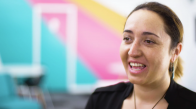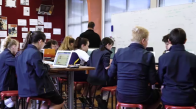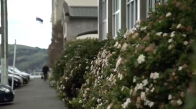The digital technologies teacher, principal, and students discuss the success of the approach used to engage students, and in particular girls, in digital technologies.
Creativity, critical thinking, and problem solving in digital technologies
Transcript
Kawana Wallace, Digital Technologies teacher: So because we’ve got this collaborative approach to critical thinking and design thinking, we’re all on the same playing field – we speak the same language now.
Kim Basse, Ruapehu College Principal: One of our technology teachers also has his degree in psychology. He’s using his digital class to talk about the pedagogy behind learning. So he’s talking about Carol Dweck's work in terms of the mind growth set. So that’s about, you know, you have a challenge in your life and your workplace – how do you overcome it? And it’s all about keeping an open mindset. It’s about skills like facing problem-solving, getting over a difficulty, working and understanding and problem-solving – those sorts of skills. So that class is talking about how they’re learning in that particular area, keeping an open mind, and trying to problem-solve when they get to difficulties. That discussion, that pedagogical discussion about learners learning, is also happening in other areas of the school, which is fantastic for me as a principal to see the discourse of learning also happening in hard technology and some of the other subjects.
Kawana: What I think is one of my biggest successes is the fact that the majority of our engagement has come from our girls and we know that in the industry females currently only make up 8% of some sciences. So it’s a really big achievement to have our girls become passionate about digital technology and wanting to become software engineers and designers.
Student: I like the whole website designing, when it looks pretty. I’ve done a couple. I’m doing one in class in social studies now. I’m using the coding, the website making, side of things. So I’m making a website. It’s about child soldiers and who they are and what happens, and more like awareness and stopping it. So I’m looking at South Sudan and just the different things that goes on there and their civil war. Yeah, what they’re being forced to do.
Kawana: Since we began the digitech programme this year, we’ve had some major successes and some of those include students who now want to become digital scientists and computer scientists. We’ve had a year-13 boy who now wants to do mechatronics, and part of our digitech programme we’ve had a year-9 girl, who came up to me yesterday and said how she wanted to be a software engineer, focusing in the security expertise. And she’d already started researching things like white hat hacking and bank security and things like that. And just seeing that passion growing in these students, just is really fulfilling and it shows that we’ve been successful, that we’re actually making an impact.
Erena Mikaere-Most, Ngāti Rangi Trust: The potential of digital technology for rural communities across Aotearoa is huge. And we knew that coming into this project and so we wanted to establish an initiative, a platform, a physical place, where people could come and be exposed and explore advanced technologies.
Related videos
Collaboration between Ngāti Rangi Trust and Ruapehu College in digital technologies (04:10)
Erena Mikaere-Most from Ngāti Rangi Trust and Principal Kim Basse discuss their collaboration and the impetus for this project....
Learning with the internet of things: Overview of the programme (05:11)
Julie McMahon and Andrew Hornblow discuss the project, its drivers, and how simple and inexpensive electronics can be.
Learning with the internet of things in years 9–10 (05:37)
Julie McMahon and Mark Greenfield discuss the application of electronics and the internet of things at St Hilda’s Collegiate and King's High School....



